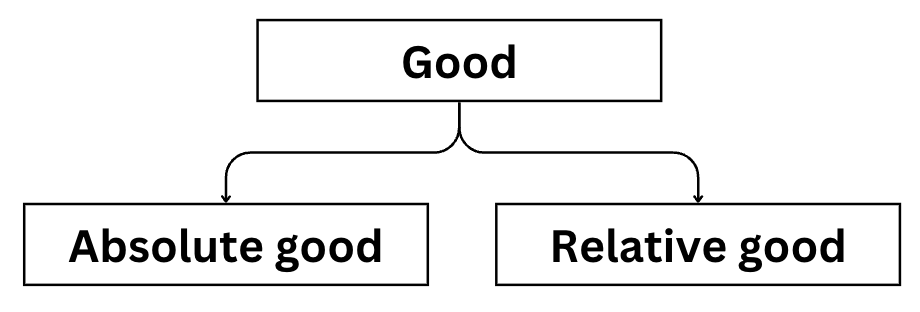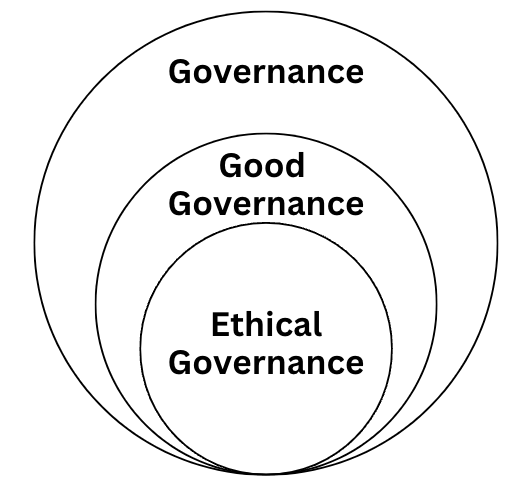Concept of Good and Virtue & Good Governance In the subject of Ethics, the ideas of good and virtue form the foundation of individual character and moral conduct. When applied to governance, these principles ensure just, transparent, and people-centric administration, promoting the overall well-being of society.
Previous Year Questions
| Year | Question | Marks |
| 2016 | Write the view of Kant on ‘Good will’. | 5M |
| 2016 | Discuss the increasing role of civil society in governance. | 10M |
| 2021 | Explain Kant’s ultimate good on the basis of relative and categorical imperative. | 5M |
Concept of Good
- The word ‘Good’ is derived from the German word ‘Gut’ which means anything valuable or useful.
- In ethics the word ‘good’ is used to express moral qualities.
Two Types –

- Relative good – It is a kind of good as a means i.e it is not desired for itself but for the sake of a higher end or good.
- Absolute good – It is desired for its own sake and is not subordinate to any superior good. It is the ultimate end of human activity.
- Eg. – Relative good – Good nutrition, exercise etc. Absolute good – Good health
- Eg. – Relative good – Disciplined self study. Absolute good – Getting selected in exam
- Eg. – Relative good – Dharm, Artha and kaam. Absolute good – Moksha [Hindu Dharma]
- Eg. – Relative good – Intellectual pleasure Absolute good – Happiness [Aristotle’s summum bonum]
Virtue
- The word ‘virtue’ is derived from Latin ‘Vir’ which means a hero.
- It corresponds to the Sanskrit word Virya, meaning manliness, bravery, power, energy, or excellence.
- Hence, Virtue refers to the inner character and its excellence.
Virtue according to different philosophers
Krishna (Geeta) –
Sthithpragyta, Nishkam Karma, Yoga (bhakti, Gyaan, Karma etc) makes one’s inner character excellent and hence essential virtues.
Socrates –
Knowledge is the only virtue and ignorance is the only vice.
Plato –
Wisdom, courage, Temperance and justice are 4 Cardinal Virtues
Aristotle –
Happiness and virtue go together. Summum Bonum i.e happiness is the highest virtue. This happiness must come from intellectual pleasures and philosophical contemplation
Buddha –
Dhamma is the true virtue and various ways like 8 fold paths, madhyam marg are means to achieve this virtue
Mahavira –
Virtues like 5 Mahavrata (Satya, Ahimsa, Bramhcharya, Asteya and Aparigraha), Ratnatraya (Samyak darshan, Samyak Jnana, Samyak charitra), Forgiveness (Micchami dukkadam) and self discipline and knowledge (Jina)
Immanuel Kant –
Virtue is the fortitude of will to fulfill one’s duties despite internal and external obstacles
John Rawls –
Virtues of fairness, impartiality, non discrimination or positive discrimination, equity and justice
Jeremy Bentham –
Virtue is the greatest happiness/pleasure of greatest number [Utilitarianism]
James Mills –
Virtues (like kindness, honesty, benevolence, and justice) are those qualities of character that tend to produce happiness, both for the individual and for society as a whole
Epicureanism –
Virtues are not an end itself , but rather means to achieve happiness and tranquility in life
John Locke –
Virtues involve acting in accordance with reason and natural law, respecting and upholding the rights and freedoms/liberty of others and fulfilling obligations towards the society
Confucius –
“Five Constants” or the “Five Virtues,” which includes – Ren (compassion or kindness), Yi (Justice/fairness/equity), Li (maintaining harmony and order in interpersonal relationships and society), Zhi (wisdom or knowledge) and Xin (Credibility/trust)
Thomas Hobbes –
Virtue, according to Hobbes, involves obedience to political authority, adherence to laws, and behaviors that contribute to the stability and security of society (Social contract theory)
Voltaire –
Voltaire believed that true virtue lies in the exercise of reason and the pursuit of knowledge, rather than blind adherence to dogma or tradition. Voltaire also valued virtues such as tolerance and compassion. He advocated for religious tolerance
Chankya –
Virtues like temperance (self control), integrity (Against corruption), fortitude, humility, donation (Philanthropy) etc
Shankaracharya –
According to Shankaracharya’s teachings in Advaita Vedanta spiritual growth, self-realization and Gyaan yoga are essential virtues to realize the non-dual nature of reality
Kabir –
As depicted in his writings (Dohas), inner purity, love, devotion to the divine, compassion and selflessness are core virtues
Nanak –
Naam Simran (meditating upon the divine name), Seva (Selfless Service), Equality (regardless of caste, creed, gender, or social status) and Santokh (Contentment) are the virtues of Sikhism as depicted by Guru Nanak
Vivekananda –
Virtue involves living a life of fearlessness, truthfulness, unselfishness, purity of heart, and service to humanity, guided by the principles of Vedanta philosophy
Good governance
- Governance is the exercise of political, economic and administrative authority to manage a country’s affairs at all levels.
- Good governance – Good governance is the governance with principles like responsiveness, equitability and inclusiveness, decentralization , consensus oriented, accountability, rule of law, participation, efficiency and transparency.
- Ethical Governance – Governance with ethical values embedded like integrity, transparency, service attitude, empathy etc.


- Responsiveness – Jan Sampak portal, CPGRAM (Centralised Public Grievance Redress and Monitoring System), etc
- Decentralization – Different units of governance like local government (Panchayati raj and urban local bodies), federalism, etc
- Consensus-oriented decision-making – My Gov App to invite decision of citizens, Gram sabha meetings, Ratri chaupals etc
- Accountability – Towards the constitution of India, Citizens, seniors and govt in power
- Rule of law – Ensuring equality of law and equal protection of law [Article 14]
- Efficiency – Ensured through ACR report (ANNUAL CONFIDENTIAL REPORTS), Biometric attendance, Performance-based appraisal etc
- Transparency – Ensured by laws like RTI, Social audit, Govt audit and Internal audit
Citizen Charter
- A citizen’s charter is a document that outlines the commitment of an organization to its citizens in terms of services quality, standard, timely delivery, accessibility, affordability, information, grievance redress mechanism [SST AAI GRM]
- Elements –
- Vision and Mission Statement
- Details of business transacted by the organization
- Details of clients
- Details of services provided to each client group
- Details of grievance redress mechanism and how to access it
- Expectations from the clients
Concept of Good and Virtue & Good governance / Concept of Good and Virtue & Good governance
FAQ (Previous year questions)
According to Aristotle, Virtue is a mean between two extremes
Every virtue lies between two vices [in moderation] – Principle of Golden Mean
Example – Courage between cowardice and foolhardiness
Example – Ambition between greed and sloth
Example – Political neutrality between Flattery and hostility/hatred towards politicians I don’t hate politicians. I hate bad politics – T.N. Seshan
If the question was – Explain Virtue as a means, then answer –
According to Epicureanism, Virtues are not an end in themselves, but rather a means to achieve happiness and tranquility in life
According to Gandhi, the virtue of Ahimsa is a means to achieve Truth
According to Plato, Virtues like Wisdom, Courage, and temperance are means to achieve Justice
According to Socrates, theVirtue of knowledge acts as a means to achieve moral excellence as an end
The word ‘Good’ is derived from the German word ‘Gut’, which means anything valuable or useful
In ethics, the word ‘good’ is used to express moral qualities.
Example :
According to Jeremy betham, benefit to greater number is good
According to Buddhism, following 8 fold path is good
According to Geeta, Sthithpragyta, Nishkam Karma and Yoga are good.
Kant: Good is a good will, acting from moral duty
My Idea of good and administration –
Ensuring qualities like responsiveness, equity and inclusiveness, decentralization, consensus-oriented, accountability, rule of law, participation, efficiency, and transparency in administration
Ex – Transparency through RTI, Social audit, Internal audit, Technology [e-filing, Biometric, CCTV, Online bidding], etc
Shri P Manivannan [IAS officer batch 1998] – Installed CCTV cameras in his office to give the public an extra eye
Ex – Consensus-oriented decision-making – My Gov App to invite the decision of citizens, Gram sabha meetings, Ratri chaupals, etc
Following economic goods like efficiency, professionalism, and discipline
Upholding constitutional laws and rules
Strict adherence to civil services conduct rules and code of ethics
An administrator must follow values like impartiality, political neutrality, and anonymity [2nd ARC]
Ex – Nripendra Mishra [Working with all governments], Ashok Khemka [Transferred across all governments]
Inculcating empathy among administrators
Ex P Narhari – Worked for disabled people being DM of Indore [Panchsparsh therapy].
Ex Prashant Nair – Operation Sulaimani – Free food for hungry people
Value of Adaptability and Tenacity in Civil Servants
Ex Kiran Bedi made herself adaptable in various roles like a traffic police officer, IG in Tihar Jail, or reform in Goa
Ex Arti Dogra ma’am – Despite physical challenges, she is known for her administrative efficiency
When selection, transfer, posting, and promotions are based on objective parameters
Ex – Civil Services Board for Promotion and Transfers
Ex – Fair selection process by UPSC
Personal integrity, commitment, compassion, and Courage
Poma Tudu – (An officer who walked for 2 hours to meet tribals on the hill and listen to their grievances)
Satyandra Dubey, who laid his life fighting against corruption
JK Soni Sir – Charan Paduka Abhiyaan and Raktkosh Foundation
Mridul Kacchawa Sir – Mridul, along with his team, sent 44 infamous Chambal dacoits and 12 notorious criminals to jail in just 11 months
Durga Shakti Nagpal – Action against sand mafia in Greater Noida
Only a good administration can lay the strong foundation for Viksit Bharat 2047, and morality must be the guiding principle for the same. Recently, the Government of India launched Mission Karmyogi to instill integrity among civil servants, a holistic path towards good governance.
Or you can do it in table format too
How the Idea of ‘Good’ Can Structure a Good Administration:
My Idea of Good
Administrative Application
1. Ethical governance and integrity
Enforces honesty, impartiality, zero tolerance for corruption (e.g., Lokpal, e-office reforms)
Ex – IES officer satyendra dubey (laid his life fighting against corruption)
Ex – Ashok Khemka sir
2. Justice and fairness
Ensures non-discriminatory service delivery (e.g., Right to Information, Social Justice Schemes)
Ex – T N Sheshan sir
3. Welfare of the weakest
Promotes inclusive growth (e.g., Antyodaya, DBT for the poor)
4. Transparency and accountability
Builds public trust (e.g., Citizen Charters, Jan Sunwai, RTI)
Ex – Transparency through RTI, Social audit, Internal audit, Technology [e-filing, Biometric, CCTV, Online bidding], etc
Shri P Manivannan [IAS officer batch 1998] – Installed CCTV cameras in his office to give the public an extra eye
5. Compassion and empathy
Citizen-centric approach (e.g., Disaster relief, health services, dignity in delivery)
Ex P Narhari – Worked for disabled people being DM of Indore [Panchsparsh therapy].
Ex Prashant Nair – Operation Sulaimani – Free food for hungry people
6. Efficiency with purpose
Efficient use of resources for public interest, not just procedural correctness
People’s road by Armstrong pame
Metro man E shreedharn
A good administration is not built merely on laws and procedures, but on a value-based understanding of the ‘Good’.
When administrators integrate moral clarity, compassion, justice, and public welfare into decision-making, they translate the abstract idea of ‘Good’ into concrete good governance
The naturalistic fallacy rejects the idea that what is found in nature is good.
It was given by G.E. Moore
It’s also called the is-ought fallacy
It Supports the Is-Ought Gap by David Hume
Ex – If we follow the Is-ought theory = Old age Diseases are natural and hence good in nature and should not be treated. But naturalistic fallacy rejects it and forces us to treat sick people
Ex – We shouldn’t interfere when a wild animal attacks a human — it’s just the animal’s natural instinct. Although attacking is a natural behavior for a wild animal, morally, we have an obligation to protect human life. So intervention is justified.”

